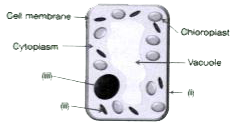Explain the main function of cell wall in plant and animal cells
Step-by-Step Solution:
1. Definition of Cell Wall:
- The cell wall is a rigid outer layer that surrounds the cell membrane in plant cells. It is primarily composed of cellulose.
2. Function of Cell Wall in Plant Cells:
- The main functions of the cell wall in plant cells include:
- Protection: It protects the plant cells from mechanical damage and osmotic stress.
- Osmotic Stress Protection: The cell wall helps prevent the cell from bursting when water enters during osmosis, which is the movement of water across a semi-permeable membrane from an area of lower solute concentration to an area of higher solute concentration.
- Structural Support: It provides strength and rigidity to the plant, helping it maintain its shape.
3. Absence of Cell Wall in Animal Cells:
- In contrast to plant cells, animal cells do not have a cell wall.
- This means that animal cells rely on their flexible cell membrane for protection and structural integrity.
4. Conclusion:
- In summary, the main function of the cell wall is to provide protection and support to plant cells, while animal cells do not possess a cell wall, hence they do not have this function.
- The cell wall is a rigid outer layer that surrounds the cell membrane in plant cells. It is primarily composed of cellulose.
- The main functions of the cell wall in plant cells include:
- Protection: It protects the plant cells from mechanical damage and osmotic stress.
- Osmotic Stress Protection: The cell wall helps prevent the cell from bursting when water enters during osmosis, which is the movement of water across a semi-permeable membrane from an area of lower solute concentration to an area of higher solute concentration.
- Structural Support: It provides strength and rigidity to the plant, helping it maintain its shape.
- In contrast to plant cells, animal cells do not have a cell wall.
- This means that animal cells rely on their flexible cell membrane for protection and structural integrity.
- In summary, the main function of the cell wall is to provide protection and support to plant cells, while animal cells do not possess a cell wall, hence they do not have this function.
Topper's Solved these Questions
- CELL-STRUCTURE AND FUNCTIONSBOOK - PEARSON IIT JEE FOUNDATIONCHAPTER - CELL-STRUCTURE AND FUNCTIONSEXERCISE - Track Your Learning - I
10 Videos
- CELL-STRUCTURE AND FUNCTIONSBOOK - PEARSON IIT JEE FOUNDATIONCHAPTER - CELL-STRUCTURE AND FUNCTIONSEXERCISE - Track Your Learning - II
8 Videos
- CONSERVATION OF PLANTS AND ANIMALSBOOK - PEARSON IIT JEE FOUNDATIONCHAPTER - CONSERVATION OF PLANTS AND ANIMALSEXERCISE - COMPETITION CORNER
43 Videos
Similar Questions
The plant cell has different organ which perform various functions. In addition to the cell membrane, plant cells also have another layer around them called the cell wall. This rigid layer is not present in animal cells. It is made up of a non-living material called cellulose Check the below figure and try to answer the following questions

Explain the main function of cell wall in plant cell
View SolutionExplain below points :
State the function of cell wall in plant cells
View Solution
Knowledge Check
The main function of bacterial cell wall is to
Aprotect the internal structures of cellBprovides shape to the cellCprevent cell from burstingDcontrol the movement of substances into and out of the cellThe main arena of cellular activities in plant and animal cells is
ACell membraneBMitochondriaCCytoplasmDRibosomeThe main difference between plant and animal cell is
Aplant cells has small vacuolesBanimal cell lacks rigid cell wallCanimal cells has large vacuolesDplant cell lacks rigid cell wall
